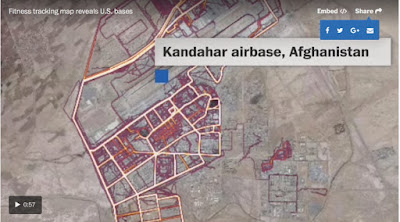If I lived in a war zone I would probably walk, crunch and use the elliptical. The stress relief would be worth the tedium, or even the danger. So I get why people wear their fitbits when they’re in harm’s way, especially if they’re gadget geeks who want to measure their workouts.
But I don’t get why they share their data with a fitness sharing app called Strava, which then posted the whereabouts and movements of their customers in a heat map available for all to see. So by clicking on a route called Sniper Alley outside the American base in Kandahar, Afghanistan, you could find the names and hometowns of those who use it. Combine this with some basic Googling and you have a trove of information.
I first read about this oversight yesterday, how it was discovered almost by accident by a college student in Australia. Why didn’t someone realize sooner that this technology could be used to reveal troop movements, the identifies of agents and so much more sensitive information?
Sharing data is a way to personalize technology, to humanize it. But whatever is shared can be abused.
I hate to admit it, but in a world of smart cars, smart appliances and smart houses … we’re going to have to start reading, really reading, those privacy statements. And companies who collect sensitive data must do a better job of telling us how and when they use it.
Otherwise we may find ourselves walking in Afghanistan — with sniper guns trained on us.
(Photo: Washington Post)









